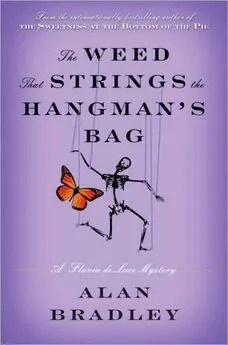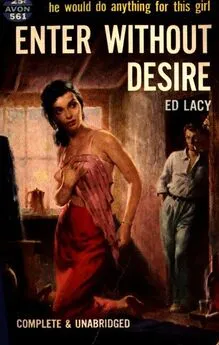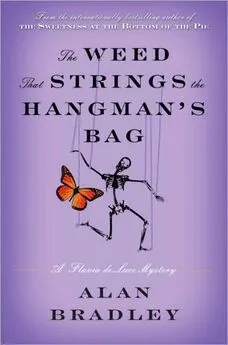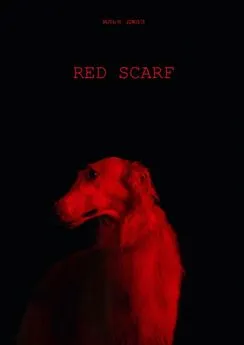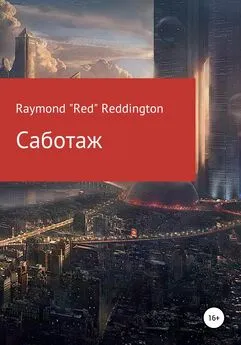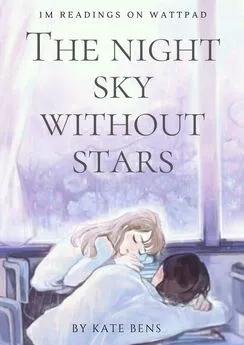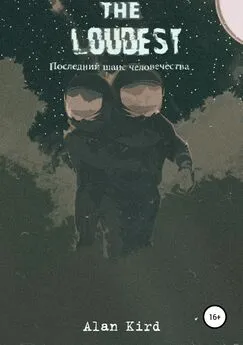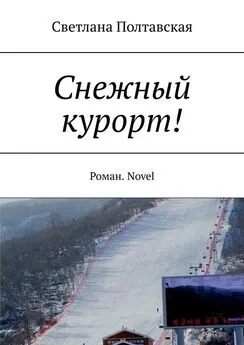Alan Bradley - A Red Herring Without Mustard: A Flavia de Luce Novel
- Название:A Red Herring Without Mustard: A Flavia de Luce Novel
- Автор:
- Жанр:
- Издательство:неизвестно
- Год:неизвестен
- ISBN:нет данных
- Рейтинг:
- Избранное:Добавить в избранное
-
Отзывы:
-
Ваша оценка:
Alan Bradley - A Red Herring Without Mustard: A Flavia de Luce Novel краткое содержание
A Red Herring Without Mustard: A Flavia de Luce Novel - читать онлайн бесплатно полную версию (весь текст целиком)
Интервал:
Закладка:
Not one of these seemed likely to be the Red Bull that had attacked Fenella.
“Why do you ask?” he said, seeing my obvious puzzlement.
“Oh, no reason,” I said. “It was just something I heard somewhere … the wireless, perhaps.”
I could see that he didn’t believe me, but he was gentleman enough not to press.
“Here’s St. Tancred’s,” I said. “You can let me off at the churchyard.”
“Ah,” said Dr. Darby, applying the Morris’s brakes. “Time for a spot of prayer?”
“Something like that,” I said.
Actually, I needed to think.
Thinking and prayer are much the same thing anyway, when you stop to think about it—if that makes any sense. Prayer goes up and thought comes down—or so it seems. As far as I can tell, that’s the only difference.
I thought about this as I walked across the fields to Buckshaw. Thinking about Brookie Harewood—and who killed him, and why—was really just another way of praying for his soul, wasn’t it?
If this was true, I had just established a direct link between Christian charity and criminal investigation. I could hardly wait to tell the vicar!
A quarter mile ahead, and off to one side, was the narrow lane and the hedgerow where Porcelain had hidden in the bushes.
Almost without realizing it, I found my feet taking me in that direction.
If her claim about Fenella had been a lie, she couldn’t really have been afraid of me, as she had pretended. There must, then, have been some other reason for her ducking into the hedgerow—one that I had not thought about at the time.
If that was the case, she had successfully tricked me.
I climbed over the stile and into the lane. It had been just about here that she’d slipped into the shrubbery. I stood for a moment in silence, listening.
“Porcelain?” I said, the hair at the back of my neck rising.
Whatever had made me think that she was still here?
“Porcelain?”
There was no answer.
I took a deep breath, realizing it could easily be my last. With Porcelain, you could always so quickly find yourself with a knife at your throat.
Another deep breath—this one for insurance purposes—and then I stepped into the hedgerow.
I could see at once that there was nobody hidden here. A slightly flattened area and a couple of trampled weeds indicated clearly where Porcelain had squatted the other day.
I crouched beneath the branches and wiggled myself into the same position that she must have assumed, putting myself in her shoes, looking out at the world as if from her eyes. As I did so, my hand touched something solid … something hard.
It was shoved inside a little tent of weeds. I wrapped my fingers round the object and pulled it into view.
It was black and circular, perhaps a little over three inches in diameter, and was made of some dark, exotic wood—ebony, perhaps. Carved into its circumference were the signs of the zodiac. I ran my forefinger slowly across the carved image of a pair of fish lying head to tail: Pisces.
The last time I had seen this wooden ring was at the fête. It had been on the table in Fenella’s tent, supporting her crystal ball.
There was little doubt that Porcelain had pinched the ball’s base from the caravan, and was making off with it when I had surprised her in the lane.
But why? Was it a souvenir? Did it have some sentimental attachment?
Porcelain was simply infuriating. Nothing that she did made any sense.
Finding the base reminded me that the ball itself, hidden safely away in plain sight among my laboratory glassware, was still awaiting careful study.
My intention had been to examine it for fingerprints, even though most traces had likely been washed away by immersion in the river. I remembered how Philip Odell, the wireless detective, had once pointed out to Inspector Hanley that the glandular secretions of the palms and fingers consisted primarily of water and water-soluble solids.
“ So you see, Inspector ,” he had said, “ Garvin’s fatal mistake was in running his fingers through his hair. The barber had scented it with brilliantine containing bay oil, which, of course, is soluble in alcohol, but not in water. Even after a night at the bottom of the millstream, the fingerprints on the handle of the knife were still plain enough to put his villainous neck in a noose .”
Philip Odell aside, I had my own ideas about underwater fingerprints. There was, for instance, a quite readily available household substance that would fix and harden any traces of residual grime that might be left by a killer’s hands. Given time, I would do the laboratory work, write it up, and present it to Inspector Hewitt on a silver platter. He would, of course, take my paper home at once and show it to his wife, Antigone.
But there had been no time. The compulsory cinema night and choir practice at St. Tancred’s, followed by my visit to Fenella in hospital, had robbed me of the opportunity to carry out the necessary research.
I would hurry home and begin at once.
I had no more than one foot out of the thicket when I heard the sound of an approaching motor. I ducked back into hiding, remembering to turn my face away as the thing swept past. By the time I judged it safe to come out again, the machine had vanished in the direction of Buckshaw.
I did not actually spot the Inspector’s blue Vauxhall until I had already set foot between the griffins of the Mulford Gates. It was parked off to one side beneath the chestnuts, and he was leaning patiently against it, waiting.
Too late now to turn and bolt. I’d have to make the best of it.
“Oh, Inspector,” I said, “I was just about to ring you up and tell you what I’ve found!”
I was aware that I was gushing, but I didn’t seem to be able to help myself. I held the wooden base out to him at arm’s length.
“This was in a thicket by the side of the lane. I think it’s part of Fenella’s crystal ball.”
He pulled a silk handkerchief from his breast pocket and took the wooden O from my hands.
“You shouldn’t have touched it,” he said. “You ought to have left it where it was.”
“I realize that,” I told him. “But it was too late. I touched it before I saw it—without meaning to. It was hidden under some weeds. I’d just stepped into the bushes for a moment …”
The look on his face told me that I was skating on thin ice: I had already used the “sudden call of nature” excuse, and it wouldn’t bear repeating.
“You saw me, of course, didn’t you? That’s why you stopped and waited for me here.”
The Inspector ignored this neat bit of deduction.
“Get in, please,” he said, holding open the back door of the Vauxhall. “It’s time for a talk.”
Sergeant Graves turned round and shot me a quick, quizzical glance from the driver’s seat, but he did not smile. Only then did I realize how much trouble I was in.
We drove to the front door of Buckshaw in silence.
It was my second full confession in as many days.
We were sitting in the drawing room—all of us, that is, except Father, who was standing at the window, staring out, as if his life depended on it, across the ornamental lake.
He had insisted that we all of us be present, and had summoned Feely and Daffy, both of whom had annoyingly come at once, and were now seated primly side by side on a flowered divan like a couple of toads come to tea.
“It is regrettable,” Inspector Hewitt was saying, “that our investigation has been so badly compromised. Crime scenes disturbed … evidence tampered with … crucial information withheld … I hardly know where to begin.”
He was talking about me, of course.
“I have tried to impress upon Flavia the seriousness of these matters, but with little success. Therefore, I’m afraid I’m going to insist, Colonel de Luce, that until such time as our work is complete, you keep her confined to Buckshaw.”
I couldn’t believe my ears! Confined to Buckshaw? Why not have me transported to Australia and be done with it?
Well, so much for choir duty and future cinema nights. So much for Father’s decree that we needed to get out more as a family.
Father mumbled something and shifted his gaze from the ornamental lake to the distant hills.
“That said,” the Inspector went on, “we come to the real reason for our being here.”
Real reason? My heart sank as if it already knew something that I did not.
The Inspector brought out his notebook. “A statement has been taken from a Miss Ursula Vipond, who says that she witnessed the removal from the river of what she described as …” He opened the notebook and flipped through a couple of pages. “… a glass sphere …”
My eyes widened.
“… by a child whose name she has reason to believe is Flavia de Luce.”
Confound the woman! I knew at once that this busybody could be none other than that troll, Ursula, who haunted Vanetta Harewood’s cottage in Malden Fenwick. I’d listed the odious creature in my notebook, but hadn’t known her surname.
She’d been standing hidden among the bushes at the Palings, watching as I pulled Fenella’s crystal ball from the river.
“Well?”
I could tell by his tone that the Inspector was becoming impatient.
“I was going to give it to you straightaway,” I said.
“Where is it?” he asked.
“In my laboratory. I’ll go get it and—”
“No! Stay as you are. Sergeant Graves will see to it.”
Surprised, the sergeant broke off gazing at Feely and leapt to his feet.
“Just a moment, Sergeant,” she said. “I’ll show you the way.”
The traitor! The minx! Even with her little sister under attack, Ophelia could think of nothing but courtship.
“Wait,” I said. “The laboratory is locked. I’ll have to go fetch the key.”
Before anyone could think to stop me, I had swept past Feely and the sergeant, out the door, and was halfway down the hall.
The truth was that the key was in my pocket, but without turning me upside down and shaking me, they had no way of knowing that.
Up the stairs I dashed, taking them two at a time, as if all the demons of Hades were at my heels. Into the east wing I fled, and down the long corridor.
I fumbled at the lock of the laboratory, but something inside the mechanism seemed to be mucked up, as if—
I gave a fierce shove and the door flew open, propelling me almost into the arms of … Porcelain!
 TWENTY-SIX
TWENTY-SIX 
“WHAT ARE YOU DOING here?” I hissed, my heart still pounding like a trip-hammer. “I thought you were in London.”
“I might have been,” Porcelain said, “but something made me come back to apologize.”
“You did that once before,” I said, “and you botched it. I can live without another of your so-called apologies.”
“I know,” she said, “and I’m sorry. I didn’t tell you the truth about Fenella. She wasn’t conscious when I went to the hospital. And she didn’t tell me you’d attacked her. I made all of it up because I wanted to hurt you.”
“But why?”
“I don’t know. I wish I did, but I don’t.”
Suddenly she was in tears, sobbing as if her heart would break. Without thinking, I went to her, put my arms around her, and pulled her head against my shoulder.
“It’s all right,” I said, even though it wasn’t.
But something inside me had undergone a sudden shift, as if my interior furniture had been rearranged unexpectedly, and I knew, with a strange new calmness, that we would sort things out later.
Читать дальшеИнтервал:
Закладка:

